

 Lynn Heins County Director
Lynn Heins County Director




 Lynn Heins County Director
Lynn Heins County Director

Welcome to University of Illinois Extension in Franklin, Jackson, Perry, Randolph, and Williamson counties! It is my pleasure to lead a team of dedicated staff and volunteers who provide reliable, research-based programs to diverse residents and businesses within our communities. Illinois Extension remains a trusted source to address the most pressing issues in Illinois relating to food, health, environment, community, and economy.
This past year, our unit conducted a needs assessment through key informant interviews with stakeholders and community partners to understand local issues within our community. We wanted to know what resources or efforts exist, what barriers they have experienced addressing these issues, and potential ways to partner to address target audiences for positive impact. The most pressing issues that rose to the top included:
• Food insecurity
• Engaging youth
• Mental health
We address food insecurity as we help people grow and source local food and teach them how to prepare healthy meals for their families.
4-H empowers young people to dream about a better tomorrow and gives them the tools to reach it through opportunities for youth. Programs like Weathering the Storm help farmers and local growers understand the signs and symptoms of chronic stress while equipping them with the tools and resources they need. Understanding the priorities within our unit helps us with program planning, resources, and efforts to help further address issues through outreach, partnerships, and collaborations.
The work outlined in this impact report was made possible through community partnerships and strong local support from county boards, 4-H and Extension foundations, home and community education associations, county farm bureaus, and individual and business contributions. Additional important revenue sources are provided through federal, state, and other grant funds. We are pleased to share this brief impact report highlighting Extension’s local work. Thank you for your continued support!
Lynn Heins County Extension DirectorEn 2 ga 02 gem 3 ent
The University of Illinois UrbanaChampaign’s land-grant mission thrives each day through Extension’s programs, resources, knowledge, and dedicated staff that are responsive to five grand challenge themes:
Community: Support Strong and Resilient Residents
Economy: Grow a Prosperous Economy
Environment: Sustain Natural Resources at Home and in Public Spaces
Food: Maintain a Safe and Accessible Food Supply Health: Maximize Physical, Mental, and Emotional Health
Extension leaders, staff, and stakeholders define priorities that create meaningful, mission-centered outcomes throughout the state:
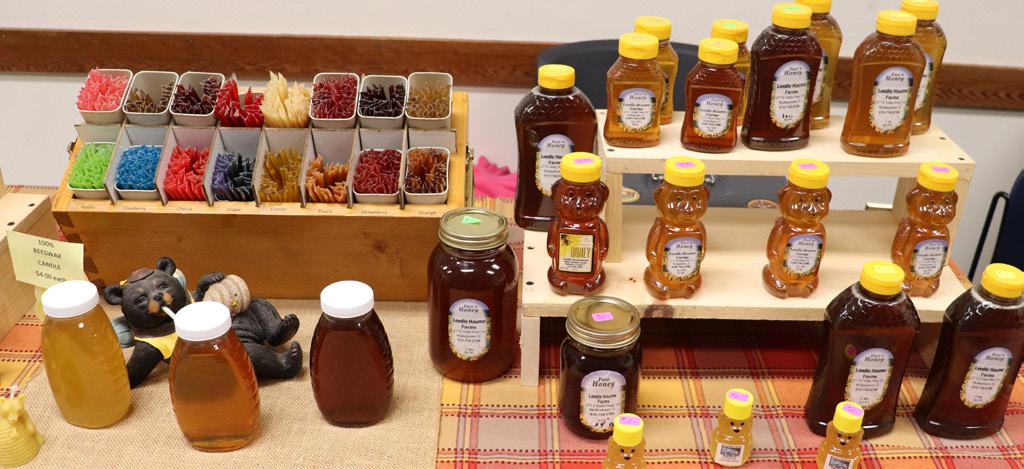
With each passing generation, people become more and more removed from their food source. Whether individuals live in the third story of an apartment or on a 10-acre plot of land, homesteading skills can help bring them closer to the food they eat. This past year, Extension offered a homesteading series that included a variety of workshops led by educators and experts throughout the state. While Extension has provided homesteading programming for decades, offering the old information in new and fresh packaging resonated with the present generation of homesteaders.
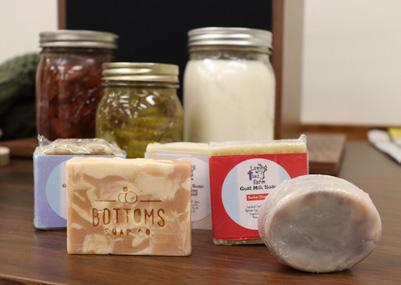
Homemade soaps, lotions, and canned vegetables and meats are some of the items individuals can make on their own through homesteading practices.
Many people choose to homestead to make healthier choices and to live better for the environment. Because homestead food is locally sourced, often just outside your back door, there is a smaller carbon footprint to get the food to the table. Homesteading is one way to combat the disconnect.
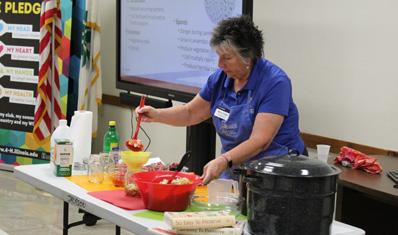
Economically, homesteading strengthens local food markets, creating a more robust economy. The program showcased that you do not have to own a large piece of land or be a dedicated farmer to practice homesteading skills. From planning and organization to prioritization and multitasking, this series empowered individuals to strike the perfect balance between homesteading tasks and everyday life commitments as they learned to grow, raise, and preserve their own food.
Over the past year, 16 unique programs were offered, with an average of 30 participants attending each workshop. While each program was a separate event in the series, many participants attended most of the monthly events. Favorite topics will return in 2024, along with an expanded list of additional educational topics to explore. Some of the programs featured in the 2023 series included:
• Fruit trees & small fruits
• Goats and sheep
• Backyard poultry
• Composting
• Organic gardening
• Growing pumpkins
• Seed saving
• Tools for the homestead
• Growing flowers & herbs
• Canning
• Soap making
• Weed identification
• Cover crops
• Fall gardening
• Regenerative grazing
• Beekeeping
Learn more about the series go.illinois.edu/ModernHomesteading
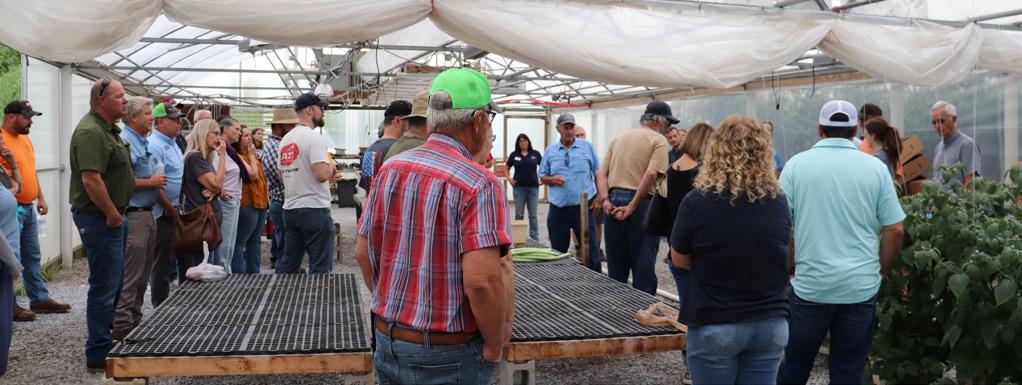
Growers and farmers at all levels benefit from practical, efficient, and sustainable approaches to cultivating produce, crops, and livestock that feed their families, local communities, and the world. For nearly a decade, Extension has hosted a summer twilight series highlighting diverse farming enterprises across the lower counties of Southern Illinois. Our educators and staff have partnered with local farms to showcase different production and marketing practices that local farms and agriculture businesses utilize. Learning from experts in the field is a valuable and effective way to gain insights and a deeper understanding of new topics to support growers, equipping them with resources, knowledge, and tools to enhance productivity. Recent programs included:
• Hydroponic tomato production
• Strawberry plasticulture
• Pasture-raised livestock and poultry
• Local meat processing and sales
• Direct-market sales, value-added products from local sources
• Cover crops, pumpkin production, and fall agritourism
By meeting on working farms, area growers have hands-on learning experiences and the chance to network with other growers, an essential step in forming relationships with other local enterprises. This opportunity helps to increase business for both parties, grow the capacity of our local foods and small farms, and support a more robust, more sustainable regional economy.
76 Educational Sessions
12
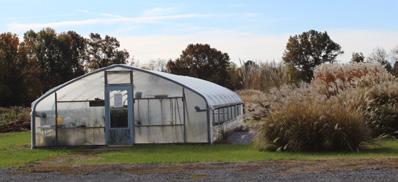
Many growers treat infestations through chemical control methods, which can negatively impact biodiversity, human health, and the environment. Through research studies with Specialty Crops Entomologist Kacie Athey, biological controls were used instead of insecticides for pest control. Predatory insects like lady beetles, Orius, or predatory mites were released into the high tunnels, where they acted as natural enemies feeding on harmful pests. The project started in 2021 at the UIUC Sustainable Student Farm and was replicated in the high tunnels at Dixon Springs Agricultural Center. The study found that aphids were significantly reduced with biological control, whitefly numbers were not different between the release and control tunnels, and thrips pressure was worse in tunnels with predator release compared with the control. The project expanded in 2023 to investigate other biological control methods, with the Jackson County high tunnel as the test site. Instead of purchasing predators, they modified the environment by planting flowers and cover crops outside of the structure to draw in and retain more predators to help control pests. These plantings have resources for predators that can sustain them before the pests make it to the crops. The ongoing study will monitor whether the flowers and cover crops lead to reduced insect infestations. Continued research is crucial for developing and implementing effective, low-pesticide farming practices that benefit local growers.
2,640 Program Attendance
100
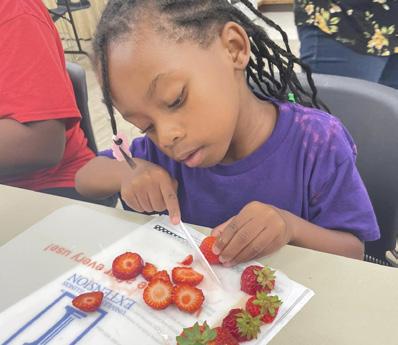
When youth don’t know how to cook, they may be tempted to reach for unhealthy foods. Illinois Junior Chef is a fun, engaging program that allows youth to learn about nutrition, try new healthy recipes, and gain kitchen skills. Extension hosted 18 cooking programs throughout Franklin, Jackson, Perry, Randolph, and Williamson counties during the summer, reaching 228 participants. Staff taught students about kitchen safety as they learned to use cooking utensils and properly measure ingredients. Recipes used during the program introduce participants to healthy food options as each student made nutritious meals and snacks. Each student also received a cookbook filled with healthy recipes to try at home.
1,167 Nutrition Education Classes
5,091
Total Estimated SNAP-Ed Reach
Many students eat two-thirds of their meals at school, so it’s important they receive healthy, nutritious food. Extension staff and partners helped local school food service staff better serve their students through School Lunch Rocks. Over 100 participants attended the two-part training as they learned how to implement share tables, which reduce food waste in the cafeteria while providing hungry students with additional food. Staff also learned more about healthy menu planning and flavor stations, which allow students to add flavor to their food without adding salt. All participants earned USDA Professional Standards credit as they learned best practices for school food service.
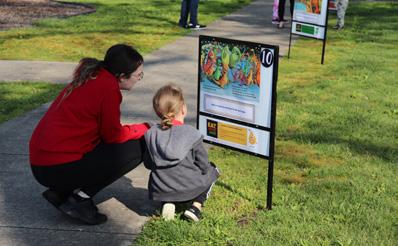
Keeping kids active can sometimes be a challenge. Extension’s pop-up book walks encouraged families to exercise while building a passion for reading. The outdoor, interactive experience involved a deconstructed version of a beloved children’s book. Each stop along the walk included a page from the book and a fun activity to get the whole family moving. This past year, the expanded program offered 30 book walks in 11 locations from April to October. Thanks to a donation from John A. Logan’s Child Care Resource and Referral, families enjoyed 10 different books. The walks also showcased activities and resources from several Eat.Move.Save. curricula to help families build a healthy lifestyle.
Poor nutrition and lack of physical activity can lead to childhood obesity. Extension regularly partners with local early childhood centers and K-12 schools to build healthy eating habits and encourage movement. Staff share information from nutrition curricula, including Serving up MyPlate, CATCH Kids Club, and Eat Fit. Organ Wise Guys is a popular program that empowers kids to be healthy and smart from the inside out. Children learn about nutrition and health by drawing pictures of their favorite fruits and vegetables and getting their hearts pumping with fun exercises. Building a solid foundation can help set students on a path to health as they continue to grow and develop.
63
Partnerships with Early Childhood Centers and K-12 Schools
23
Partnerships with Emergency Food Sites and Other Types of Organizations
124
Policy, System and/or Environmental Changes Adopted by SNAP-Ed Partner Organizations
More than half of Illinois adults have a known chronic health condition, with many facing inequities that make improving their health more challenging. Extension and community partners are meeting community members where they are through our mobile teaching kitchen. Extension partnered with SIH, the Region 5 Regional Hospital Coordination Center, and local health departments to bring a full-service teaching kitchen to our communities to support nutrition education efforts. Staff share cooking skills and Eat. Move. Save. recipe demonstrations that are affordable and healthy. The kitchen makes visits to SNAP-eligible sites like food pantries, schools, and farmer’s markets in the lower 16 counties of Illinois. Community members are encouraged to enjoy locally-grown produce, and they can taste the final product, with some clients trying new foods for the first time.
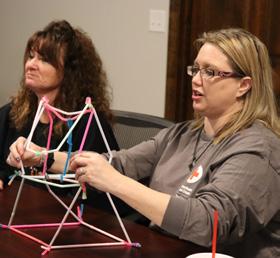
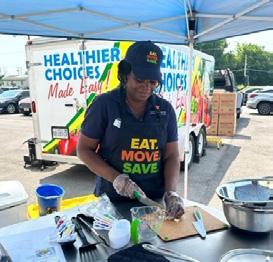
A child’s brain architecture starts in the formative years and can be shaped for better or worse. Extension met with local educators to emphasize their role in solid childhood support systems through the Brain Architecture Game. The simulation helps individuals understand experiences in early brain development: what promotes it, what derails it, and the consequences for society. Teams worked together to build the “brain” of a child. Straws signified positive support like a stable home environment, access to nutritious food, or caring adults. The more straws received early on helped to build a stronger foundation. As each life year passed, participants drew cards with positive or negative events to strengthen the brain or make it topple. The eye-opening game showcased what some children experience and emphasized that educators and staff can be a support for the children in their care.
Quality sleep is vital for one’s health and well-being. Sleep disorders change how people sleep and impact their ability to fall asleep, stay asleep, and feel rested. Symptoms include increased movement, irregular sleep-wake cycles, irregular breathing, and excessive daytime sleepiness. A good night’s sleep can contribute to a healthy immune system, muscle repair, and improved memory. Extension hosted a six-week sleep Education for Everyone Program (SLEEP) series for residents. During the program, created by Michigan State University Extension, participants learned about sleep behaviors, viewed and discussed short videos, and set personal sleep goals using the techniques introduced during the series. Participants went away with information on mindfulness and relaxation, a better understanding of sleep duration guidelines, sleep myths, and sleep hygiene practices for more restful nights.
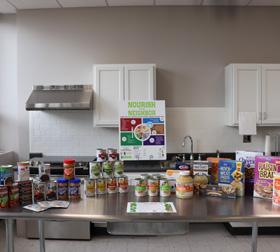
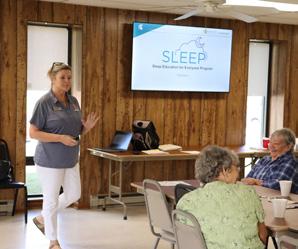
Food insecurity affects every community in Illinois. Extension’s work with food pantries helps to address those most impacted by food insecurity through research, community service, and advocacy. Pantry donations are a major food source, but not all foods being donated meet the nutritional quality recommended by Feeding America. Through the Nourishing Your Neighbor Toolkit, Extension worked with local food pantries to implement healthy food drives. The efforts have led to more nutritious food donations to improve the diet quality of food pantry clients. The Client-Choice Toolkit showcases how food pantries can provide shopping-style opportunities. Clients select the foods they need to feed their families and manage health conditions like diabetes, high blood pressure, and food allergies. The implementation of both toolkits helped make positive changes in local food pantries.
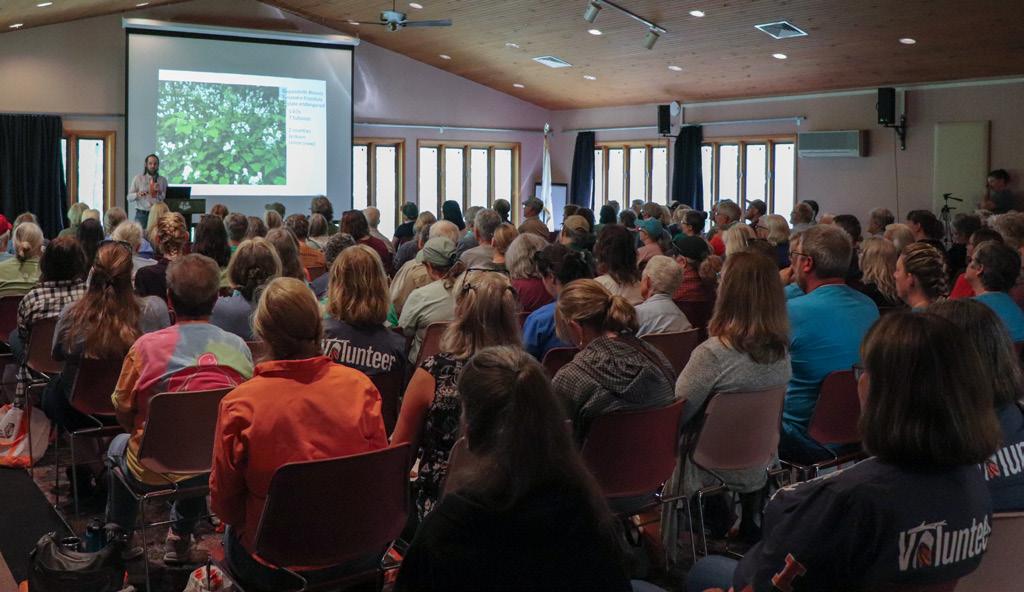
We live in a world of unprecedented environmental challenges. With the accelerating impact of climate change, loss of biodiversity, and depleting natural resources, conservation efforts are critical. Master Naturalist volunteers understand this issue. They are dedicated to managing natural resources and areas throughout the state, acting as stewards of our environment, and teaching those skills to others.
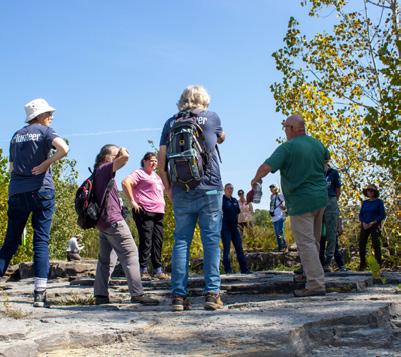
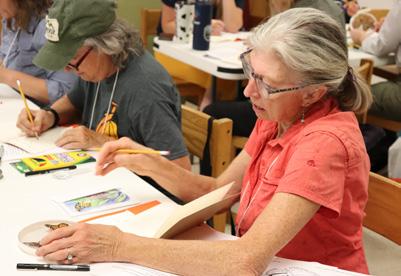
Like-minded individuals came together to share a love of nature and inspire change during the Master Naturalist Conference in Southern Illinois. The beautiful landscape of the Shawnee National Forest served as a perfect backdrop for volunteers to connect, network, learn, and grow. Illinois Botanist Chris Benda served as keynote speaker, sharing stories and photos of exciting career encounters within the state and beyond in the past 20 years. Participants could choose from diverse breakout sessions, including citizen science, interpretive programs, nature journaling, inclusivity in nature programs, an overview of global and regional climate change, and archaeological investigations. Outdoor activities included a plant hike, birding hike, fisheries management, and trail maintenance. Those who wanted to explore the region’s beauty could attend optional field trips at Millstone Bluff, Sunnyside Acres prairie reconstruction, Lake Murphysboro, Pomona Natural Bridge, or Snake Road. The conference helped spark new ideas and inspire change as Master Naturalists continue to put research into action through outreach, education, and service in their local communities. Learn How
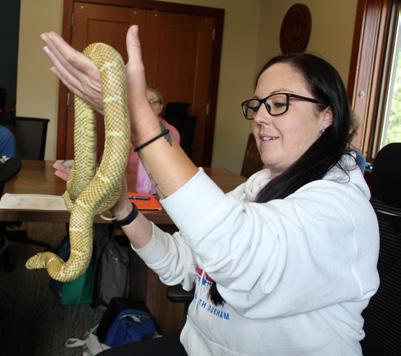
Local volunteers donate their time and energy to improve our communities. In 2023, 19 individuals completed Master Naturalist and Master Gardener training to join the 3,164 volunteers making a difference statewide. From food donation gardens to youth educational programs and more, Master Gardeners help others learn to grow. Master Naturalists serve as engaged environmental stewards, removing invasive species and trash from public lands, partnering with local agencies to deliver environmental education programs, and contributing to community science efforts. When people volunteer or advocate for local issues, they become part of the solution.
58
Trained Master Gardener and Master Naturalist Volunteers
$145,480
Master Gardener and Master Naturalist Volunteer Value
Ewing Demonstration Center connects farmers and agricultural professionals with University researchers to develop and implement research to benefit local growers. A current trial is helping our state’s diverse soybean production systems capitalize on the rapidly emerging carbon markets. Researchers are measuring soil health, water quality, and carbon credits at field sites that represent Illinois soil-climate regions. By understanding soil health management, researchers identify ways soybean production can reduce nutrient loss. The project results will help position Illinois soybeans’ sustainability in national and global markets.
Many Southern Illinoisans struggle to put food on the table. But it’s not just about hunger. Access to nutritious food is important for those with limited resources. Through a collaboration with community partners, Extension established the Cultivating Care Donation Garden in 2021. Volunteers help with garden maintenance and upkeep during each growing season, including harvesting and delivering fresh produce. Combined with surplus produce from Dixon Springs Ag Center, over 1,000 pounds of food was donated to The Salvation Army Food Pantry this past year. The continued work with partners and supporters helps reduce hunger and provides access to fresh, healthy produce year after year.
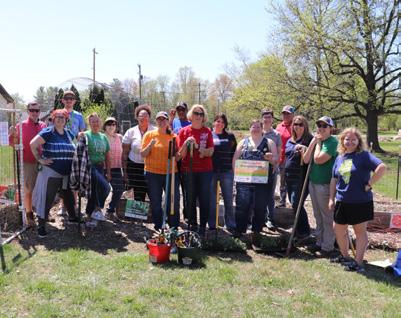
4,850 Program Attendance
133 Educational Sessions
A strong sense of community brings people together to develop shared goals, support one another, and work together for the good of the whole. Extension works alongside partners to address local issues relating to food, health, environment, economy, and community. Through a partnership with the local Farm Bureau, Extension helps with Farm Safety Day each spring. The event educates children about safety practices when working or playing outdoors. Extension also partners with local soil and water districts for the Conservation Fair each fall. The two-day fair features hands-on activities that help foster a sense of responsibility and stewardship for the planet. Community partnerships create engaging and impactful opportunities for young people to learn, grow, and thrive.
The DuQuoin State Fair has been a tradition for over a century. This past year, Extension showcased a variety of programs during the event. Master Gardener and Master Naturalist volunteers shared information about volunteer opportunities and answered horticulture-related questions. They also led pop-up programs on propagating plants, testing soil, and regrowing vegetable scraps. Through the Thank a Farmer exhibit, 4-H youth, staff, and volunteers led participants through an interactive display, highlighting the farming community’s crucial role in our food supply, economy, and more. Our 4-H booth engaged youth as they explored hands-on activities related to 4-H projects, like aerospace paper airplanes, seed bombs, and a photography challenge, and local youth also tested their cooking skills during the 4-H Food Challenge. The events were a great way to showcase all that Extension offers.
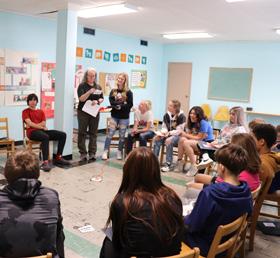

Entering high school is a significant milestone in every student’s academic journey, but the jump from middle school can be intimidating and overwhelming for many students. This past spring, over 200 youth participated in the Perry County EighthGrade Teen Conference to help teens transition into high school. The event has been a community tradition for 33 years, and guest speakers from the region connected with teens to address both academic and social aspects. Topics like substance abuse, cyberbullying, positive relationships, and avoiding risk-taking behaviors were favorites among students. Local police officers discussed new driving laws and the consequences of drinking and driving, and current high school students answered questions and shared tips for the next four years. The program is a great way to lay the foundation for a successful and fulfilling high school experience.
Youth need strong support systems to develop healthy lives, and helping teens cope with peer pressure is crucial for their emotional well-being and personal development. Many teens face challenging social situations where they may be exposed to drugs, alcohol, and tobacco. 4-H helps youth develop skills that serve them for a lifetime. Some of these skills – communicating with others, relating to change, and making responsible decisions – help youth develop internal strength to resist risky behaviors. Health Rocks is a 4-H program with activities to help teens develop the know-how to protect them from using these substances. The program helps youth make knowledgeable decisions and recognize the consequences of their choices. By understanding the facts, youth are more likely to make healthy decisions and are less likely to be influenced by peer pressure, the media, or emotional factors.
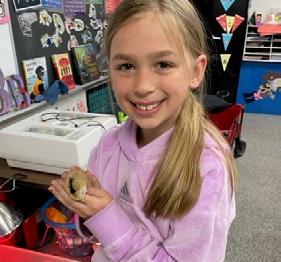
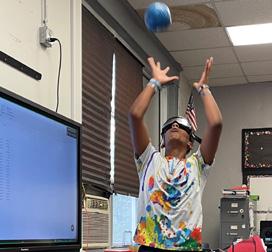
Children are naturally curious about the living things in the world around them, and 4-H is all about experiential learning, where youth “learn by doing” with fun, handson activities. Through the embryology and incubation program, interactive exercises, experiments, and observations allow youth to witness the incredible journey of a chick from an egg to an embryo. A Randolph County school participated in the spring program as they hatched chicks in their classroom. During the 21-day incubation period, students learned to prepare eggs, set up an incubator, record progress, turn eggs, and test eggs for fertility. The program helped students understand the miracle of life as they watched a chicken egg transform into an active, living creature. Signature 4-H STEM programs are a way to inspire the next generation of curious minds and cultivate a lifelong love for science.
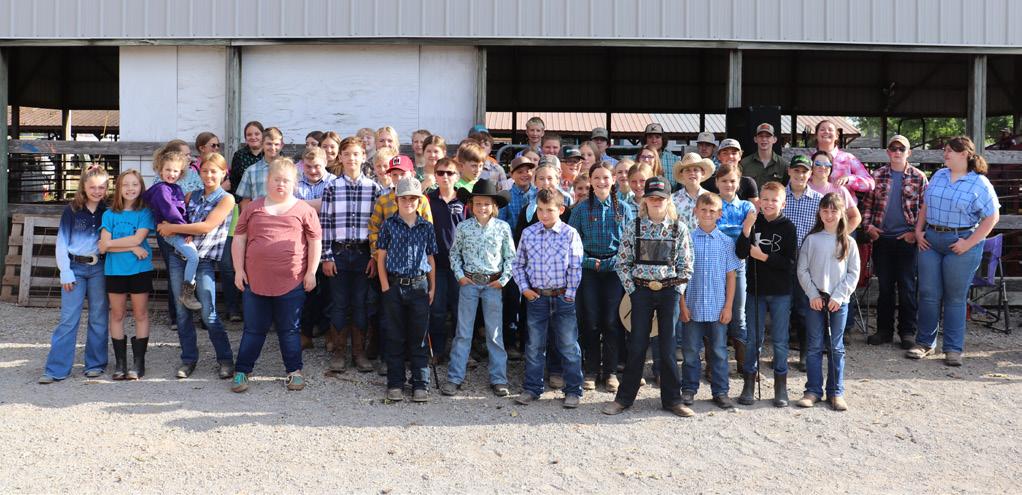
Local fairs are a tradition and the season’s highlight for many 4-H members. The shows allow youth to demonstrate the knowledge and skills gained throughout their time in 4-H. During general shows, 4-H youth were judged in visual arts, photography, robotics, foods, and more. Those who received state delegation could travel to Springfield to show their projects at the Illinois State Fair. During livestock shows, 4-H members showed the animals they raised and cared for over the past year. Showmanship helped foster confidence in communicating knowledge and experience as youth spoke directly to each judge about the health and care of their livestock. Youth who raised beef, swine, sheep, poultry, and rabbits for their annual projects could participate in the livestock auction. Local businesses and supporters made the event a success, with the entire proceeds of each sale going directly to local youth. 4-H events help develop well-rounded individuals with a diverse set of skills and a strong sense of community.
81
4-H Club Memberships
64
4-H Clubs
12,511
4-H Affiliations (4-H Experiences)
2,727 Fair Exhibits
Learn how to get involved with 4-H. go.illinois.edu/4-HJourney
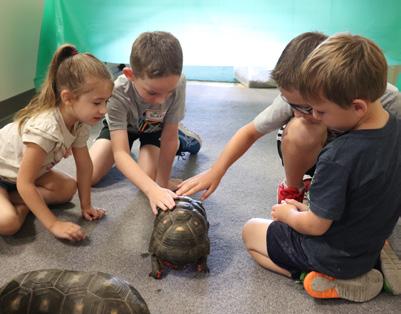
Thriving youth are the core of healthy, robust communities. As youth grow and develop, a sense of belonging can help them navigate challenging times. 4-H clubs, programs, and camps help students explore new things while meeting new friends. These events go beyond just a break from school during the summer months. They offer a range of benefits that contribute to personal, social, and even academic growth. This summer, Perry County hosted Kids in the Park to connect kids with nature through hands-on projects and field trips. Jackson County helped youth nurture their inner artist during Art Camp. And the littlest explorers, ages 5-7, learned about all things outdoors during the Williamson County Cloverbud Adventure Camp. 4-H is all about sparking an interest in what youth enjoy the most. Whether it’s learning how to build a robot, caring for the environment, or painting a masterpiece, 4-H encourages children to be themselves by exploring their interests and choosing a path that leads to happiness.
Lynn Heins County Director
Cindy Bauman
4-H Program Coordinator
Talon Becker Commercial Agriculture Educator
Katie Bell
Local Foods and Small Farms Educator
Misty Bernhard SNAP-Ed Community Worker
Nick Brown
SNAP-Ed Community Worker
Terri Cagle Office Support Specialist
Reed Capps 4-H Program Coordinator
Franklin County
1212 Route 14 West
Benton, IL 62812
(618) 439-3178
Mon - Fri, 8 am - 4:30 pm
Landon Chandler SNAP-Ed Community Worker
Taylor Dashiell Office Support Assistant
Carrie Eldridge 4-H Youth Development Educator
Andy Fisher Farm Mechanic
Kylie Genisio SNAP-Ed Community Worker
Ramona Girtman 4-H Program Coordinator
Terri Jones
Office Support Assistant
Jaqueline Kellerman Agricultural Research Technician
Jackson County 402 Ava Rd. Murphysboro, IL 62966 (618) 687-1727
Mon - Thurs, 7:30 am - 5 pm
Fri - By appt only
Erica Kurtz
Office Support Associate
Mindy Martin Office Support Assistant
Becky Needham
4-H Program Coordinator
Jennifer Newbury
SNAP-Ed/EXCITE Program Coordinator
Shannon Pulliam
SNAP-Ed Community Worker
Maggie Ray Local Foods and Small Farms Program Coordinator
Robin Ridgley Family Life Educator
Kim Rohling Horticulture Educator
Perry County
203 N Walnut, Suite A Pinckneyville, IL 62274 (618) 357-2126
Mon - Fri, 8 am - 4:30 pm
Randolph County 1403 N Hillcrest Dr. Sparta, IL 62286 (618) 443-4364
Mon - Fri, 8 am - 4:30 pm
Rhonda Shubert 4-H Program Coordinator
Kristen Skelton
SNAP-Ed Community Worker
Kristoffer Taylor Office Support Assistant
Heather Willis Marketing & Communications Program Coordinator
Toni Kay Wright SNAP-Ed Educator
Williamson County 1301 Enterprise Way, Suite 60 Marion, IL 62959 (618) 993-3304
Mon - Fri, 8 am - 4:30 pm
@UIExtensionFJPRW @UniversityofIllinoisExtensionFJPRW @uofiextensionfjprw uie-fjprw@illinois.edu
College of Agricultural, Consumer & Environmental Sciences niversity of Illinois, U.S. Department of Agriculture, Local Extension Councils Cooperating. niversity of Illinois Extension provides equal opportunities in programs and employment. U U
If you need a reasonable accommodation to The Illinois Nutrition Education Programs are funded Issued in furtherance of Cooperative Extension work, participate, please contact the event coordinator. by the Supplemental Nutrition Assistance Program Acts of May 8 and June 30, 1914, in cooperation with Early requests are strongly encouraged to allow (SNAP) and Expanded Food and Nutrition Education the US Department of Agriculture by the Director, sufficient time to meet your needs. Program (EFNEP). Cooperative Extension Service, and University of Illinois.
©2024